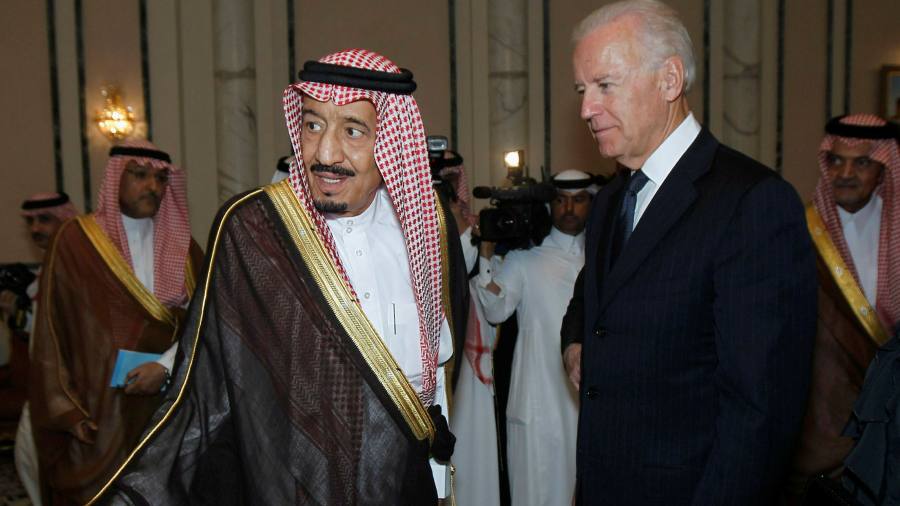[ad_1]
Joe Biden last week delivered a measured snub to the de facto leadership of Saudi Arabia, run on a day-to-day basis by Crown Prince Mohammed bin Salman. The White House said from now on the US president would deal with his Saudi “counterpartâ€, Prince Mohammed’s father King Salman.
The transactional and dynastic contacts nurtured under Donald Trump, which included a WhatsApp relationship between the crown prince and Jared Kushner, Trump’s son-in-law, are over. During his election campaign Biden threatened to treat Saudi Arabia as a “pariah†because of its worsening human rights abuses. He is re-examining the 75-year-old US relationship with the kingdom.
That looks set to include a serious upset. Washington is about to declassify intelligence linking Prince Mohammed to the savage 2018 murder of Jamal Khashoggi, a courtier turned critic who wrote columns for the Washington Post. A former aide to the kingdom’s intelligence chief, Khashoggi was assassinated and dismembered by a hit squad flown from Riyadh after being lured to the Saudi consulate in Istanbul. No trace of him has been found.
In an earlier report, the CIA concluded that, far from being a rogue operation as the Saudis claimed, the crown prince ordered the murder. Then-president Trump said “maybe he did, maybe he didn’tâ€, but decided billions of dollars in arms sales to the kingdom and Saudi support for his campaign against Iran outweighed what he called “the worst cover-up everâ€.
The Khashoggi affair was nevertheless the worst diplomatic crisis with Saudi Arabia since the September 11, 2001 attacks on the US, in which 15 of the 19 hijackers were Saudis. The questions now are: how directly does the Biden administration intend to implicate the Saudi heir to the throne — will it name names? And how will it follow up? Finesse and firmness are needed to avoid a crunch.
It seems unlikely that the US will try to remove Prince Mohammed, 35. He is the favourite son of King Salman and grandson of King Abdulaziz ibn Saud, founder of the kingdom, from a line of succession he is deemed to have queue-jumped by some members of the House of Saud. The intention appears to be to end the Trump-Kushner coddling that conferred impunity on the prince’s reckless and ruthless behaviour, and get back inside the tramlines of institutional relationships.
Last week Lloyd Austin, the US defence secretary, spoke to Prince Mohammed, who is among other things the Saudi minister of defence. After drone and rocket attacks on the kingdom by Houthi rebels in Yemen, Austin reiterated the US was committed to Saudi Arabia’s defence. But Washington has withdrawn support for Saudi offensive action in Yemen, a war Prince Mohammed launched six years ago that has brought the Arab nation famine and disease. The Biden team, backed by Congress, is pushing for an end to the conflict and has suspended arms deliveries to the Saudis.
This administration may also want to free Mohammed bin Nayef, the cousin and former interior minister Prince Mohammed deposed as crown prince in 2017. He was arrested last spring along with Prince Ahmed bin Abdulaziz, his uncle. Mohammed bin Nayef was long the point-man of the Washington security establishment, and it was to him that the US sent Biden’s current secretary of state, Antony Blinken, when Mohammed bin Salman emerged seemingly from nowhere in 2015.
The US may also seek to help Saad al-Jabri, a valued American ally and former counterterror chief now in exile in Canada, whose family says Riyadh tried to lure him back in exchange for freeing two of his children the Saudis have jailed like hostages. All of which raises the delicate question of whether to support Prince Ahmed, King Salman’s younger brother, who some leading princes are said to prefer as successor.
The Biden team, for all its distaste for the current crown prince, is unlikely to want to go there. But Mohammed bin Salman, with the support of the king, has single-mindedly cleared his path to the throne in a chain of palace coups, replacing an absolute monarchy that rested on family consensus with himself as despot. The young prince has shown no inclination to unpick that in any respect — particularly when it involves leading figures who know the kingdom’s secrets.
[ad_2]
Source link






